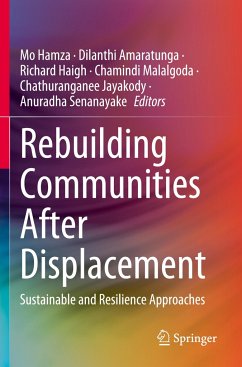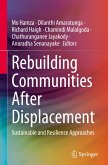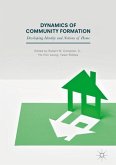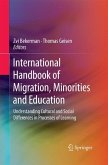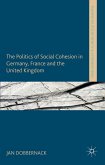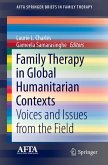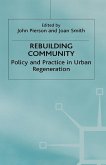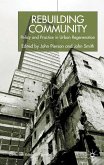Rebuilding Communities After Displacement
Sustainable and Resilience Approaches
Herausgegeben:Hamza, Mo; Amaratunga, Dilanthi; Haigh, Richard; Malalgoda, Chamindi; Jayakody, Chathuranganee; Senanayake, Anuradha
Rebuilding Communities After Displacement
Sustainable and Resilience Approaches
Herausgegeben:Hamza, Mo; Amaratunga, Dilanthi; Haigh, Richard; Malalgoda, Chamindi; Jayakody, Chathuranganee; Senanayake, Anuradha
- Broschiertes Buch
- Merkliste
- Auf die Merkliste
- Bewerten Bewerten
- Teilen
- Produkt teilen
- Produkterinnerung
- Produkterinnerung
This book presents a collection of double-blind peer reviewed papers under the scope of sustainable and resilient approaches for rebuilding displaced and host communities. Forced displacement is a major development challenge, not only a humanitarian concern. A surge in violent conflict, as well as increasing levels of disaster risk and environmental degradation driven by climate change, has forced people to leave or flee their homes - both internally displaced as well as refugees. The rate of forced displacement befalling in different countries all over the world today is phenomenal, with an…mehr
Andere Kunden interessierten sich auch für
![Rebuilding Communities After Displacement Rebuilding Communities After Displacement]() Rebuilding Communities After Displacement100,99 €
Rebuilding Communities After Displacement100,99 €![Dynamics of Community Formation Dynamics of Community Formation]() Dynamics of Community Formation77,99 €
Dynamics of Community Formation77,99 €![International Handbook of Migration, Minorities and Education International Handbook of Migration, Minorities and Education]() International Handbook of Migration, Minorities and Education294,99 €
International Handbook of Migration, Minorities and Education294,99 €![The Politics of Social Cohesion in Germany, France and the United Kingdom The Politics of Social Cohesion in Germany, France and the United Kingdom]() Jan DobbernackThe Politics of Social Cohesion in Germany, France and the United Kingdom39,99 €
Jan DobbernackThe Politics of Social Cohesion in Germany, France and the United Kingdom39,99 €![Family Therapy in Global Humanitarian Contexts Family Therapy in Global Humanitarian Contexts]() Family Therapy in Global Humanitarian Contexts54,99 €
Family Therapy in Global Humanitarian Contexts54,99 €![Rebuilding Community Rebuilding Community]() Joan SmithRebuilding Community77,99 €
Joan SmithRebuilding Community77,99 €![Rebuilding Community Rebuilding Community]() Joan SmithRebuilding Community77,99 €
Joan SmithRebuilding Community77,99 €-
-
-
This book presents a collection of double-blind peer reviewed papers under the scope of sustainable and resilient approaches for rebuilding displaced and host communities. Forced displacement is a major development challenge, not only a humanitarian concern. A surge in violent conflict, as well as increasing levels of disaster risk and environmental degradation driven by climate change, has forced people to leave or flee their homes - both internally displaced as well as refugees. The rate of forced displacement befalling in different countries all over the world today is phenomenal, with an increasingly higher rate of the population being affected on daily basis than ever. These displacement situations are becoming increasingly protracted, many lasting over 5 years. Therefore, there is a need to develop more sustainable and resilient approaches to rebuild these displaced communities ensuring the long-term satisfaction of communities and enhancing the social cohesion between the displaced and host communities. Accordingly, chapters are arranged around five main themes of rebuilding communities after displacement.Response management for displaced communities
The Built environment in resettlement planning
Governance of displacement
Socio-Economic interventions for sustainable resettlement
The Built environment in resettlement planning
Governance of displacement
Socio-Economic interventions for sustainable resettlement
Produktdetails
- Produktdetails
- Verlag: Springer / Springer International Publishing / Springer, Berlin
- Artikelnr. des Verlages: 978-3-031-21416-5
- 1st edition 2023
- Seitenzahl: 528
- Erscheinungstermin: 20. Februar 2024
- Englisch
- Abmessung: 235mm x 155mm x 27mm
- Gewicht: 887g
- ISBN-13: 9783031214165
- ISBN-10: 3031214161
- Artikelnr.: 69847401
- Herstellerkennzeichnung Die Herstellerinformationen sind derzeit nicht verfügbar.
- Verlag: Springer / Springer International Publishing / Springer, Berlin
- Artikelnr. des Verlages: 978-3-031-21416-5
- 1st edition 2023
- Seitenzahl: 528
- Erscheinungstermin: 20. Februar 2024
- Englisch
- Abmessung: 235mm x 155mm x 27mm
- Gewicht: 887g
- ISBN-13: 9783031214165
- ISBN-10: 3031214161
- Artikelnr.: 69847401
- Herstellerkennzeichnung Die Herstellerinformationen sind derzeit nicht verfügbar.
Mo Hamza is Professor of Risk Management and Societal Safety at Lund University, Sweden. In his career spanning 36 years so far, he has worked with international development organisations including: World Bank, ADB, UNDP, UNISDR, USAID, DfID, IFRC, IUCN, Swedish Red Cross, and the Swedish Civil Contingencies Agency (MSB). His primary areas of professional expertise and research work are: Disaster risk and vulnerability reduction, post-disaster recovery, climate change impact and adaptation in fragile and failed states, and environmental displacement. Previously he was Chair of Social Vulnerability Studies at the United Nations University, Bonn, Germany; a Senior Research Fellow at the Stockholm Environment Institute (SEI), Sweden and an advisor to the MIT Climate CoLab. He has undertaken consultancy and research work in: Afghanistan, Bangladesh, Botswana, Egypt, Eritrea, Ethiopia, India, Indonesia, Jordan, Kyrgyzstan, Liberia, Nigeria, Pakistan, Saudi Arabia, Sierra Leone, Sri Lanka, Sudan, Uganda, UK, South Eastern Europe and the Balkan States. He is currently an advisor to the Swedish Civil Contingencies Agency (MSB) where he is responsible for their capacity development processes. Among various and more recent publications, Mo Hamza was the co-guest editor of a double special issue in Global Discourse Journal (2022) "Critical Exploration of Crisis: Politics, Precariousness and Potentialities", and the author of "Refugees' Integration in the Built Environment - The Sweden Case" in Sustainability Journal 2021. He was also the lead author and editor of the World Disasters Report (2015) "Focus on local actors, the key to humanitarian effectiveness". Prof. Amaratunga a leading international expert in disaster resilience with an extensive academic career that has a strong commitment to encouraging colleagues and students to fulfil their full potential. Currently she is leading University of Huddersfield, UK's Global Disaster Resilience Centre. She is recognised for her career-long impact up until 2020, and is placed among the global top 2% of influential scientists, according to the report of "Composite Citation Metrics" by Elsevier BV Netherlands and Stanford University, USA, released in August 2021. She has project managed to successful completion a large number of international research projects (over £ 20 million) generating significant research outputs and outcomes. She provides expert advice on disaster resilience to national and local governments and international agencies including the UNDRR. To date, she has produced over 500 publications, refereed papers, and reports, and has made over 100 keynote speeches in around 40 countries. Among many leadership roles, she is the joint chief editor of the International Journal of Disaster Resilience in the Built Environment. She is a member of the European Commission and UNDRR's European Science & Technology Advisory Group (ESTAG) representing the UK, a Steering Committee member of the UK Frontiers of Development programme, a Steering Committee member of the UK Alliance for Disaster Research, motivation of which is to bring together the UK's rich and diverse disaster research community to facilitate collaboration and partnership. She is a Fellow of the Royal Institution of Chartered Surveyors (RICS), a Fellow of The Royal Geographical Society, and a Fellow and a Chartered Manager of the Chartered Management Institute, UK. Richard Haigh is Professor of Disaster Resilience and Co-Director of the University of Huddersfield's Global Disaster Resilience Centre in the UK. His research interests include multi-hazard early warning, disaster risk governance and resilience in the built environment. He is the Editor-In-Chief of the International Journal of Disaster Resilience in the Built Environment and Co-Chair of the International Conferences on Building Resilience, which started in 2008. He is an expert member of Working Group 1 of Intergovernmental Coordination Group on the Indian Ocean Tsunami Warning and Mitigation System (ICG/IOTWMS). Richard and his team won the Newton Prize for Indonesia, celebrating best research innovation partnership for the project Mainstreaming Integrated Disaster Risk Reduction and Climate Change Adaption Strategies into Coastal Urban Agglomeration Policy. He has led and successfully delivered research grants funded by the UK Natural Environment Research Council, the European Commission's Horizon 2020, Erasmus+, Framework Seven Programme, Lifelong Learning, Asia Link and European Social Fund, the UK Newton Fund, the UK Foreign and Commonwealth Office, British Council and UK Parliamentary Under Secretary of State for Business, Energy and Industrial Strategy. Many of these projects were carried out in close collaboration with government, non-government organisations and industry partners. He has published widely, including an edited book by Wiley Blackwell, fifteenedited book chapters and forty-five peer reviewed journal articles, the majority of which are in ISI or SCOPUS indexed journals. He has delivered over 80 invited speeches and keynote presentations for audiences in twenty-five countries across North America, South America, Europe, Asia, Africa and Australasia. Dr Chamindi Malalgoda is a senior lecturer and the quantity surveying course leader at the Department of Design and Built Environment, School of Arts and Humanities, University of Huddersfield, UK. She is also a member of the Global Disaster Resilience Centre (GDRC) of the University. Chamindi's research interest include disaster risk reduction and resilience in the built environment. Chamindi completed her PhD in 2014 in the theme of empowering local governments in making cities resilient to disasters and is currently managing several European funded research projects related to disaster resilience and management. She has led and successfully delivered research grants funded by the Erasmus plus programme under Strategic Partnerships and International Credit Mobility including REGARD (Rebuilding after displacement) project which was completed in March 2022. She has contributed to over 40 publications, which include refereed journals, conference papers and various high impact reports. She is also a reviewer of a number of international journals in the fields of disaster resilience, construction and property management and recently guest edited a special issue on "Rebuilding communities following disasters and conflict induced mass displacements" in the Sustainability journal. Dr Chathuranganee Jayakody is a Senior Tutor in Planning and Environmental Management at the School of Environment Education and Development (SEED), Faculty of Humanities. Her role includes teaching in the area of Urban planning, Neighbourhood Planning, infrastructure planning and supervising master's Dissertations in Planning, Urban Design,Global Urban Development and Urban Regeneration & Development. Before joining the University of Manchester, she was a post-doctoral researcher at the University of Huddersfield and a research member of the Global Disaster Resilience Centre. She is also a part-time tutor at School of Architecture, Manchester Metropolitan University. She has worked in the Planning Control and Building control department at Bolton Metropolitan Borough Council. She completed her PhD in 'Architecture and the Built Environment' at the University of Huddersfield and she did her master's degree in Urban Design at the University of Salford. Her current research interest is in the areas of built environment perspective of displacement, Planning and designing Sustainable Shared Spaces and Public Open Spaces, Urban planning and urban designing interventions for disaster resilience. Ms. Senanayake is a PhD researcher at the Global Disaster Resilience Centre, University of Huddersfield, UK.By profession she is a lecturer attached to the Department of Sociology, University of Colombo, Sri Lanka, and an Attorney-at-Law at the Supreme Court of Sri Lanka. She is actively involved in youth advocacy and volunteerism in the Rotary District 3220 Sri Lanka and Maldives, where she held the position of Rotaract Country Representative from 2017-18. She completed her MPhil under the theme 'The Role of Governance in Relocation Disaster Risk Reduction Strategy' at the University of Colombo, Sri Lanka. She also holds an LLM in 'International Human Rights' from Birmingham City University, UK. Her research interests lie in the areas of displacement and relocation, Disaster Risk Governance, disaster justice, Urban Sociology, Sociology of Law, and Sociology of Medicine.
Rebuilding After Displacement: Identifying the Needs of Displaced Communities from the Perspective of the Built Environment.- Micro-narratives on People's Perception of Climate Change and its Impact on Their Livelihood and Migration: Voices from the Indigenous Aymara People in the Bolivian Andes.- From Zero to Hero? Changes in the Estonian Context for Refugees.- Challenges of Resilience Building Among Traditional Agricultural Communities Displaced by the Landslides.- Displaced Fishermen off the Coast: Impact of Multiple Hazards on Life Above the Water.- Drivers of Slow-onset Displacement in the Coastal Mid-Atlantic Region and Preferences for Receiving Locations.- Living with Landslide Risks: A Case of Resistance to Relocation Among Vulnerable Households Residing in the Kegalle District of Sri Lanka.- Internal Displacement in Nigeria: What are the Preventive Measures?.- An Architectural Analysis of Tsunami Re-settlement Villages of South of Sri Lanka.- Forced Displacement Following Reconstruction Approaches After 2005 Zarand Earthquake, Iran.- Disaster Induced Relocation of Vulnerable Households: Evidence from Planned Relocation in Sri Lanka.- How are Tamil Villages Reconstructed? Ethnography of Place-Making in Post-war Reconstruction in Sri Lanka.- Reproducing Vulnerabilities Through Forced Displacement: A Case Study of Flood Victims in Galle District, Sri Lanka.- Verticalised Slums, Governmentality and Pandemic Governance: A Critical Hermeneutical Analysis of Governance Practices in a Selected Urban High-Rise in Colombo, Sri Lanka.- Policy Recommendations for Built Environment Professional Bodies in Upgrading their Professional Competencies to Address Displacement Contexts.- Socio-economic Effects of War Against Terror Induced Displacement on Host Communities in District Kohat, Pakistan.- Social Capital and Community Organizing in Community-Based COVID-19 Management in Two Resettlement Sites in the Philippines.- A Guideline for Host Communities in Selecting Effective Livelihood's Interventions for Refugees in An Informal Refugee Resettlement: A Case Study of Chiang Mai Province, Thailand.- Changes in Social Capital After the 2011 Great East Japan Earthquake - Results of an Awareness Survey in Taro district, Miyako City, Iwate Prefecture.- The Role of Social Capital as a Post-Relocation Coping Mechanism: A Case Study of Kegalle, Sri Lanka.- Relocated or Displaced? A Social Inquiry of Tsunami Induced Relocation Programme in Southern Sri Lanka.- Migrants and Resettlement: Mobilising Co-Existence through Social Cohesion.
Rebuilding After Displacement: Identifying the Needs of Displaced Communities from the Perspective of the Built Environment.- Micro-narratives on People's Perception of Climate Change and its Impact on Their Livelihood and Migration: Voices from the Indigenous Aymara People in the Bolivian Andes.- From Zero to Hero? Changes in the Estonian Context for Refugees.- Challenges of Resilience Building Among Traditional Agricultural Communities Displaced by the Landslides.- Displaced Fishermen off the Coast: Impact of Multiple Hazards on Life Above the Water.- Drivers of Slow-onset Displacement in the Coastal Mid-Atlantic Region and Preferences for Receiving Locations.- Living with Landslide Risks: A Case of Resistance to Relocation Among Vulnerable Households Residing in the Kegalle District of Sri Lanka.- Internal Displacement in Nigeria: What are the Preventive Measures?.- An Architectural Analysis of Tsunami Re-settlement Villages of South of Sri Lanka.- Forced Displacement Following Reconstruction Approaches After 2005 Zarand Earthquake, Iran.- Disaster Induced Relocation of Vulnerable Households: Evidence from Planned Relocation in Sri Lanka.- How are Tamil Villages Reconstructed? Ethnography of Place-Making in Post-war Reconstruction in Sri Lanka.- Reproducing Vulnerabilities Through Forced Displacement: A Case Study of Flood Victims in Galle District, Sri Lanka.- Verticalised Slums, Governmentality and Pandemic Governance: A Critical Hermeneutical Analysis of Governance Practices in a Selected Urban High-Rise in Colombo, Sri Lanka.- Policy Recommendations for Built Environment Professional Bodies in Upgrading their Professional Competencies to Address Displacement Contexts.- Socio-economic Effects of War Against Terror Induced Displacement on Host Communities in District Kohat, Pakistan.- Social Capital and Community Organizing in Community-Based COVID-19 Management in Two Resettlement Sites in the Philippines.- A Guideline for Host Communities in Selecting Effective Livelihood's Interventions for Refugees in An Informal Refugee Resettlement: A Case Study of Chiang Mai Province, Thailand.- Changes in Social Capital After the 2011 Great East Japan Earthquake - Results of an Awareness Survey in Taro district, Miyako City, Iwate Prefecture.- The Role of Social Capital as a Post-Relocation Coping Mechanism: A Case Study of Kegalle, Sri Lanka.- Relocated or Displaced? A Social Inquiry of Tsunami Induced Relocation Programme in Southern Sri Lanka.- Migrants and Resettlement: Mobilising Co-Existence through Social Cohesion.

